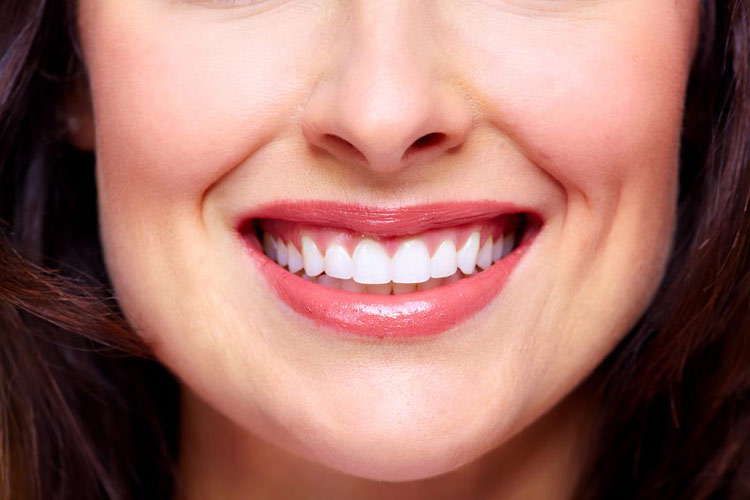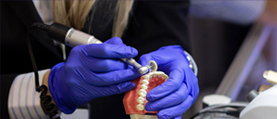Teeth whitening is a simple non-invasive procedure that can turn your stained, or discoloured teeth in to pearly white. In this procedure no enamel is lost and the colour you get may last many months.
When do you need teeth whitening?
Teeth get discoloured due to many reasons. There are external as well as internal reasons for teeth discoloration. Because of individual differences in teeth colour, some people have very white teeth and some people have yellowish hue like how people vary in their eye colour or hair colour.
The colour of the teeth comes from the internal dental tissues and pulp which decides an individual’s teeth colour. Also, as we get advanced in age, our teeth colour changes to darker hue. The external factors that are responsible for staining and discolouring teeth include foods like tea, coffee, chocolate, candies and some fruits like black current. Smoking tobacco also discolours the teeth as well as red wine.
The hard calcium deposits called tartar on your teeth also discolours your teeth. Sometimes, medicines taken for any illness including antibiotics also affects the colour of the teeth. Many times, injuries in the mouth may have created very tiny cracks, which absorbs food colours and stains the teeth.
How is teeth whitening done?
There are two major ways of carrying our teeth whitening procedure. One method involves professional teeth whitening done in the dentist’s office, and other is done at home with or without the dentist’s supervision.
When the procedure is done in the dentist’s office, they will do preliminary testing to determine whether you are a suitable candidate. Before the start of the procedure, a shield will be used to protect your gums and other soft tissue in the mouth. A special tray like a mouth guard containing the teeth whitening product will be fitted onto your teeth and allowed to be there for a few minutes for the chemical reaction to take place. After the tray is removed, the teeth will become lighter in shade.
The effect of the product will vary from one individual to another, and the type of product used based on individual need. It may last from a few months to a few years, depending on how well you take care of oral hygiene and your life style including what foods you consume and the habit of smoking.
Can teeth whitening damage teeth?
Teeth sensitivity is one of the common side effects of teeth whitening, for some people, which may result in sensitivity to cold or hot foods.
Many people experience discomfort in the gums. Sometimes white patches can be noticed on the gums after the procedure. Sore throat is one of complaints heard after teeth whitening in some people. These are temporary effects and usually disappear in a few days.
When teeth whitening is done at home with the readily available over the counter kits, there can be more risks involved compared with teeth whitening done in the dentist’s office professionally.
The treatment done at home depends on the quality of the product that is being used. Many people opt for home kits because they are cheaper but the results may not be as effective as it should be.
The home kits are not always ascertained for safety, and may turn out to be harmful. They are more acidic and therefore a risk for your teeth and the gums. Teeth whitening needs care and patience to carry out because it is a complicated procedure. If any step goes wrong then it becomes damaging for teeth and gums. The rules and concerning the safety of the product varies according to the rules of the state and the country. The chemical used for whitening agent is peroxide and the amount of peroxide in the home kit is one of the decisive factors for the success of the procedure.
Sometimes products that are available over the counter contains mild abrasive substances which harms the teeth and may harm more than helps.
When you use products which are not safe or when you do not use the products correctly, then there are chances of getting your teeth damaged.
The most common occurrence while not using safe product or not using it properly is sensitivity in the teeth.
Tooth sensitivity results from not protecting the gums while applying the product on the teeth. Also, when the product is more acidic than needed, the base of the tooth gets irritated and tooth becomes sensitive to cold or hot foods.
More acid in the product also makes the teeth etched and that increases the possibility of the tooth getting more stained after the effect of whitening wears off.
The teeth whitening process requires the gums to be shielded from the chemicals in the home kit. If gums are not protected with a rubber sheet, it may receive tiny amount of chemicals which irritate them.
In some cases, teeth become more discoloured than before the whitening process was done.
Sometimes because of the faulty product, the teeth become weak and have more chances of getting fractured. Sometimes tooth enamel gets corroded and may make the teeth more discoloured than before.
Teeth whitening as such is not harmful to teeth. It does not damage the teeth. The best way to get the teeth whitening procedure done at home is to consult your dentist. Take his advice in what product to choose from the variety that is available over the counter. Also take his advice in how to carry out the procedure in the best way possible. Teeth whitening products usually have very clear instruction. Follow those carefully. If there is a need to repeat the procedure one or more times, then do it at proper intervals as instructed.




